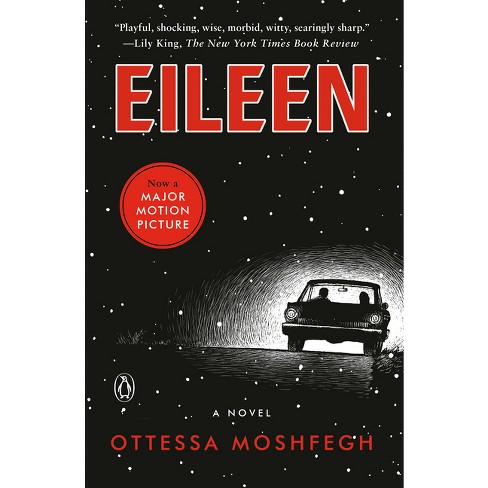By Hannah Citron
Campus News

The novel, “Eileen,” by Ottessa Moshfegh (pictured above), was released in 2015, to a mix of reviews. The story, like many of Moshfegh’s novels, explores themes of moral decay, casual depravity, and disillusionment with the claustrophobic feeling of being a young woman in the world.
The story follows Eileen, which we know right off the bat is an assumed name, despite the reader never learning the narrator’s true identity. Eileen is the sole caretaker of her abusive, alcoholic father, cocooned in an inescapable cloud of gloom and doom. She works in a clerical position at Moorehead, a local youth detention center, spending her days wallowing in crushing amounts of self-disgust, and obsessing over the idea of being desirable, of shedding her current skin and fleeing town to become a new, lavish woman. The blueprint model of her idealized self walks through the door of the detention center one winter morning, in the form of Rebecca Saint John, a new hirer tasked with revamping the education system at Moorehead. Eileen immediately becomes infatuated with Rebecca, and the reader is left to watch in horror as Eileen’s life plummets to new depths.
Moshfegh’s novels tend to contain privileged women, who have no true reason to be so disenchanted with their lives. Eileen on the other hand, is sympathetically miserable, trapped in a coffin of a house with her belittling drunk of a father. It is understandable, in the beginning, that Eileen turns to various forms of perverse entertainment to push herself through monotonous days in her dusty cubicle job, and mold scented evenings in her attic bedroom. In this way, the novel deviates from Moshfegh’s general main character archetype, and serves to round out Eileen, as a woman with an abysmal existence who turns to any means necessary (in this case fantasizing about Moorehead’s security guard), to escape it.
This focus on character is a prominent feature of the novel, which is definitely more character than plot driven. If you enjoy a quick paced, thrilling plot with frequent, explosive twists and turns, this will not be for you. If that’s what you’re craving, I recommend Gone Girl by Gillian Flynn, Bunny by Mona Awad, or Her Body and Other Parties by Carmen Maria Machado, all of which focus on similar narratives of grotesque femininity, but are more plot driven.
While I prefer books that are more plot driven in general, “Eileen” managed to hold my attention, and I enjoyed the overarching themes of the blurriness of morality, and how difficult it can be to decipher what is good or evil and what is simply the consequence of a terrible environment. We watch as Rebecca, assumed to be “well-bred” and growing up in a privileged environment attempts to come to terms with the horrors some children are forced to live through, and the terrifying effect it can have on their psyches. The shock that she experiences by working at Moorehead is jarring, and we watch as she begins to spiral with the knowledge that not everything can be fixed with pleasantries and polite inquiry.
Eileen is very unlike Rebecca in this way, and her character focuses on her overwhelming lack of empathy, and her general disdain towards any display of kindly human emotion. And yet, she is desperate to please Rebecca, as she sees a possibility in her. Perhaps, by gaining Rebecca’s approval, Eileen will become the polished woman she’s always dreamed of being.
Obligation and desperation are the consistently revisited emotions throughout the novel, and it’s an interesting introspective on both. The reader is left to wonder what they would’ve done in the situations of the novel but are forced to remain outside of its pages as they gawk in awe and horror at the actions of the characters within. Still, despite its shock value and strong character presence, it leaves a bit to be desired. Unlike the other books by Moshfegh that I’ve read “My Year of Rest and Relaxation” and “Lapvona,” the ending did not satisfy all of my remaining questions about each of our character’s fates. While it adds to the mystery and fog surrounding the entire book, I can’t help but feel it fell a little flat.
Despite this, I gave the book 3.5/5 stars, and I would recommend giving it a read if you enjoy disturbed and gross women, overtones of tumultuous family dynamics, or if you simply want to grimace at the pages of whatever you pick up next.







Facebook Comments